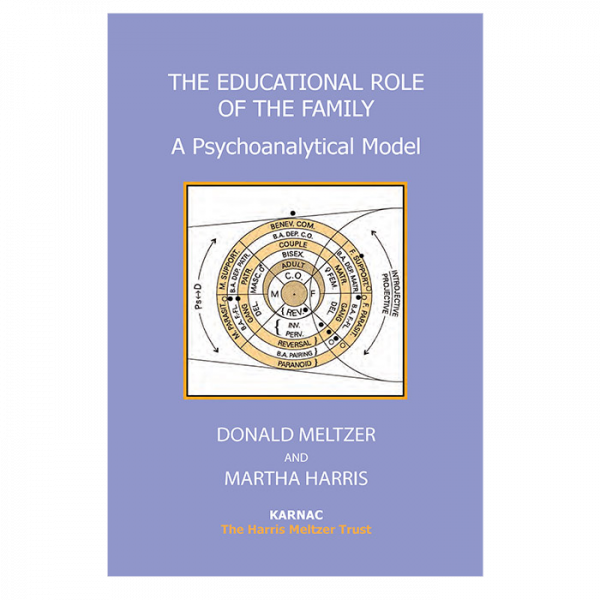Foreword
Donald Meltzer
The ugly duckling
A story by Meg Harris Williams
Introduction
Table 1: alarm symptoms
Table 2: preventive environmental actions
1. Work with the parents
The approach with parents
Anxieties about death
The narcissistic wound
The aesthetic conflict
The methodology of intervention
Interrupted pregnancy
The separation–individuation process
Catastrophic anxiety and the sense of guilt
Conclusions
2. The death of the newborn
Death at the very outset of the life
The death of the newborn
Confusion of feelings and thoughts
Odd actions and reactions
How the death of the newborn is dealt with in hospital
How parents face the grief caused by the death of their child
Bereavement
Problems encountered by staff when faced by the death of a newborn
Considerations on the sharing of the parents’ grief
Conclusions
3. Work with the staff
Work method and level
Model evolution
Theoretical discussion and presentation of the clinical experience
Phase I
The emotional atmosphere: the state of paranoid anxiety
Phase II
The concept of the neutral role
Phase III
Mirror resonance: nurses experience mothers’ and children’s feelings
Phase IV
Thinking about the work group: nurses talk about themselves
Conclusions
4. Infant observation
Methodological aspects
Difficulties of infant observation in the incubator
The first period
The child’s suffering
The child’s physiognomy
The image of the living child in the parents’ mind
The child’s states of irritability and first mental movements; object differentiation
Removal of the tracheal tube: a second birth
The child’s abrupt starting; grasping; sleep
The child’s first waking moments; the nurses start to separate from the child
The child’s first organizational patterns: 32-34 weeks
Thought formation: the integration of sensorimotor experiences and emotional experiences deriving from the object relation
The mother’s depression and its mirror-like repercussions on the nursing staff: the emotional experience modulated by the child
Splitting; the “toilet-breast”; the experience of trusting, of being contained
Conclusions
5. The neuropsychological screening of the infant before discharge from hospital
Infant examination
6. Follow-up after discharge from hospital
Neurobiological premise
The follow-up procedure
Intervention methodology
7. Psychopathological risks
Claustrophobic anxieties
Semiological elements: alarm symptoms
The parents’ role
Alarm symptoms and early psychopathology
Correlation between alarm symptoms and confirmed early psychopathologies
Multisystemic development disorders
The psychosomatic syndrome
The “minimal brain dysfunction syndrome”, or “attention deficit disturbance with hyperactivity”
Feeding disorders
Pregnancies at risk
Sleep disorders
8. Treatment of cases at psychopathological risk
The therapeutic work group
The transference with the therapist
The function of non-saturation during the session
Psychosomatic disorders and prognosis
Conclusions
9. The problems of the siblings
The birth of a sibling
The birth of a premature sibling
The risk of collusion between the parents resulting in attitudes of omnipotence and tyranny
The unresolved problems of the elder sibling
The sibling’s difficulties when the newborn suffers from cerebral palsy or a pervasive development disorder
The sibling as spectator
The sibling as an ally
Meetings with groups of siblings
Observations of the family group
Conclusions
10. The treatment and development of children with cerebral palsy
The child
The parents
A difficult development
Risks involved in the first period
The process of separation and individuation
The mothers’ group
The health providers’ group
References and bibliography
Name index
Subject index





Donald Meltzer, psychoanalyst –
‘The babies that Dr Romana Negri has worked with and here describes have indeed been born into this world “half made up”. This book is all about the emotional experience of the baby in this predicament, who has not had enough of one type of life to be able to transfer its emotional allegiances to the new one. The approach to this problem, as it is illustrated here, involves a philosophy that goes far beyond the human attitude of alleviating suffering which operates in hospital medicine. Through her work in mother–baby observation under Esther Bick and Martha Harris, supplemented by observational research in foetal behaviour by means of ultrasound, Dr Negri has become deeply engaged in this philosophy of the essential individuality of the human being by virtue of its capacity to have experiences that shape the evolving structure of its person and personality.’
Maria Rhode, Emeritus Professor of Child Psychotherapy, Tavistock Clinic/University of East London –
‘This powerful and moving book grows out of Romana Negri’s 30 years of psychoanalytically informed work as Consultant Neuropsychiatrist to a neonatal intensive care unit. The premature babies she observes are suspended between life and death, as are the feelings of their parents and the nurses who care for them. The reader witnesses how Dr Negri opens herself to the babies’ experience and introduces the tiny human beings she encounters to their parents as well as to the professionals. Her ability to support the adults, whether in maintaining hope or in dealing with death, creates a family atmosphere within a high-tech hospital department.
‘This book brings psychoanalytic insight and academic scholarship in medicine and child development together with a profound humanity. It was recognised as a classic when it was first published 20 years ago, and has now been updated and extended, with the addition of chapters on the death of the child and on the experience of siblings. It provides a fascinating glimpse of the interface between mind and body, as well as an illuminating exposition of theoretical concepts. It will be of interest to parents, to doctors and nurses, to psychoanalysts and psychotherapists, and to anyone concerned with the beginnings of mind.’